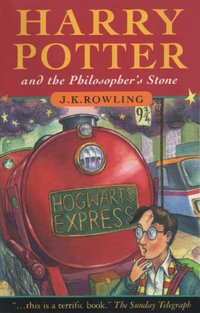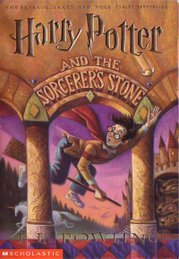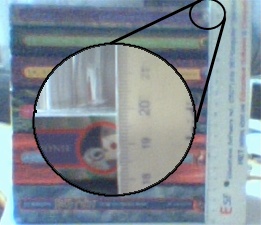Harry Potter
Harry Potter is the name of a series of fantasy novels by British writer J. K. Rowling. Six of seven planned books have been published to date. The books depict a society of witches and wizards, the main character being a young wizard named Harry Potter. more...
The first novel, Harry Potter and the Philosopher's Stone (retitled Harry Potter and the Sorcerer's Stone in the United States), was released in 1997. The first four books have been made into films, and the fifth movie is due to start filming in February 2006 (with an expected release in 2007).
As of 2005, Rowling has written the last chapter of the seventh book. The information about the last chapter is kept very secret, and the only public information is that the last chapter is written in the style of an epilogue, and will explain the fate of the surviving characters after Hogwarts. Rowling has also mentioned that the last word of the book would be "scar," which remains to be seen. However, she is unsure whether that will be in the final draft in the book, as she was asked about it in an interview conducted by fan sites Mugglenet and The Leaky Cauldron.
The Harry Potter books have achieved a profile unparalleled by any other series of books, with worldwide sales exceeding 300 million copies. They have been praised for encouraging children and indeed even adults to read, while also drawing criticism from some quarters. The books are published by Bloomsbury Publishing Plc, Scholastic Press and Raincoast Books.
Please note, most links lead to spoilers. Those that are noted will carry the following tag (if you don't notice a tag please tag it):
Overview
Publishing history
The books have fans of all ages. J. K. Rowling says she did not have any particular age group in mind when she started to write the Harry Potter books; her publishers, however, initially targeted them at young readers aged 8 to 15. The books have more recently been released in two editions, one with the original "children's" cover artwork and one with artwork more consciously aimed at adult readers. Additionally, as the series has developed, Rowling's writing has become more sophisticated and the content of the books has matured as the lead character, Harry Potter, has grown older. For instance, relationships are discussed as an issue for the teenage characters in later books. Accordingly, the reading age for the books, both in terms of content and style, is rising as the series goes on.
The first book was published in the United Kingdom by Bloomsbury, a fairly small independent publisher, in July 1997. Its initial success was based on some positive reviews and word of mouth. The first three books, Harry Potter and the Philosopher's Stone, Harry Potter and the Chamber of Secrets and Harry Potter and the Prisoner of Azkaban, all won the Nestlé Smarties Book Prize for the 9 to 11 age group. By the time the fourth book, Harry Potter and the Goblet of Fire, was published in 2000 the series had become very high-profile, and the launch received much wider publicity in the general media than was usual for a new book. At around the same time Warner Brothers began work on the series of films based on the books. The involvement of a global media conglomerate led to more concerted efforts to maximise the value of the Harry Potter franchise. The first film, based on the first book, was released in 2001, and was accompanied by video games and other branded merchandise.
The hype escalated with the publication of the next two books in the series, Harry Potter and the Order of the Phoenix and Harry Potter and the Half-Blood Prince, with midnight launch parties at hundreds of bookshops in the UK, simultaneous launch events around the English-speaking world, and intense media interest, leading to unprecedented first-day sales in the UK, U.S. and elsewhere. The series is immensely popular around the world in its many translations. Such was the clamour to read the book around the world that the English-language edition of Order of the Phoenix became the first English-language book ever to top the bookseller list in France.
According to the author, the main character Harry Potter appeared in her head whilst she was on a train from Manchester to London in 1991. Her favourite place to write the first book was at an Edinburgh café table while drinking endless cups of coffee. Sales from the books as well as royalties from films and merchandise have made Rowling a billionaire and the 620th wealthiest person in the world . Rowling is assumed to be richer than Queen Elizabeth II (see J.K. Rowling for an explanation).
Each book chronicles approximately one year in Harry's life at the Hogwarts School of Witchcraft and Wizardry, where he learns to use magic and brew potions. Harry also learns to overcome many obstacles — magical, social and emotional — as he struggles through his adolescence.
Rowling has announced that seven books are planned, each a little darker than its predecessor as Harry ages and his nemesis, Lord Voldemort, gains power. As of December 2005, six books have been published. The latest, Harry Potter and the Half-Blood Prince, was published in its English-language version on 16 July 2005. Since the publication of book five, Rowling has revealed hints about the plot of future books on her personal website.
Content and writing style
The books are written in third person limited omniscient mode, with Harry as the central character. The books are generally written from Harry's point of view, with short exceptions in Philosopher's Stone, Goblet of Fire and Half-Blood Prince. The telling of the story through Harry Potter's perspective is perhaps one of the reasons that many readers lay claim to a sense of kinship with the character.
Rowling's main strengths as a writer include her ability to drive elaborate and largely seamless plots over a very wide canvas, the convincing internal logic of her fantasy world. However, while there is much moral subtlety in many scenes in the books, the central clash between good and evil is drawn in largely black-and-white terms. Nevertheless, as the series develops, several characters have faced a choice between doing what is right or what is easy (a central theme), and moral "shades of grey" have been presented. This is especially relevent to characters such as Dolores Umbridge, some Ministry of Magic employees and Severus Snape.
Read more at Wikipedia.org






